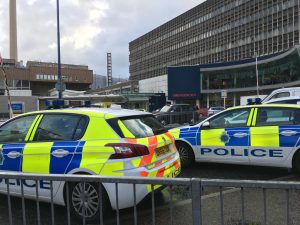Firstly I would like to introduce myself, my name is Katie and I am entering my 3rd and final year of my children’s nursing degree. I have decided to write this blog as I believe that it would be a shame for fellow or prospective students to not join me in my experience as I embark on my nursing elective on Takadori, Ghana.
I would like to apologise in advance if my spelling and grammar isn’t of the highest standard, this is something I have always struggled with and over the past 2 years at Staffordshire University I have strived to improve, with the help of the University staff and my peers. My academic capabilities might be average but my passion for nursing and specifically Children’s nursing is something I feel very strongly about. I hope that if anyone reading this that is considering a career in nursing and who thinks that it is beyond their capabilities will take something away from reading my blog and realise that dreams are achievable as hard work, dedication and passion go along way down the nursing path.
A little bit about myself, before I made the decision to embark on the student nurse journey I was an Air Hostess for 11 years, this to me was a career I had always wanted since I first traveling on an aeroplane and I believe that my experience in this career set me up for my career in nursing. I gained valuable life and people skills while working with and meeting many different people from all over the world. As soon as I entered my 30’s I realised that my burning desire to make a difference to people’s lives wasn’t being fulfilled, specifically with children. After some serious consideration I made the decision to enter the world of healthcare, I gave up my life in Manchester and moved home with my dad and enrolled at college, which led me to securing a place on the children’s nursing course at Staffordshire University, Shrewsbury campus.
Not long after starting the course there were people talking about the 4 weeks elective placement that we had at the start of our 3rd year, at the time this seemed like such a long time away but we were always reassured that time would fly and here I am at the start of my 3rd year ready to travel to Ghana for my 4 week elective placwment.
Africa has always had a place in my heart from the years I spent there while I was flying, such a different way of life from what we know. So for me it wasn’t hard to decide where I wanted to go for my elective. After speaking to a student nurse in the cohort before mine about her experience in Ghana I was then 100% sure I wanted to spend my 4 weeks there to work in a hospital and experiences life with the local people and hospital staff.
Work the world is the company I contacted to enquire about my elective placement and they gave me information on many different placements all over the world, Ghana as it turns out is one of the best placements for paediatrics which made me happy. Before I knew it I had payment my deposit and my place was booked, this was 13 months before I was due to depart.
My next challenge was to ensure I had plans in place to raise the money that I needed to be able to go. After lots of research and talking to other students who had already been abroad for their elective I started my fund raising. I needed to raise over £2,500 to cover all of my costs, this seemed daughting at the time but I made sure that I was organised and dedicated to the task, this was hard at times due to commitments and ensuring that I put 100% into my studies and placements.
I did managed to raise the amount I needed, I achieved this from a bake sale, pub quiz, car boots sales, selling half of the contents of my dad’s house (well a few bit of unwanted furniture), putting in extra hours at work and setting up a JustGiving page which my brother helped me raise a considerable amount with his running challenges he set over a 2 week period and also donations from a couple of local businesses.
I also managed to get some essential supplies donated to me, including medical supplies, gloves, antibacterial gel, scrubs and thousands of pens, thank goodness for the 46kgs luggage allowance I had.
I have had all of my immunisations and I have finally packed with 1 day to spare, I have said my goodbyes and I finally feel like I am ready to embark on this opportunity of a lifetime.
I will be staying in the work the world house with other students from across the world and my placement is in the local hospital, I have chosen to do 2 weeks on the paediatric ward and 2 weeks in NICU.
I am nervous mainly about how I will be able to channel my emotions especially while being so far from home and my amazing support network, but I am also very excited for the next 4 weeks, I genuinely believe that this experience is going to change things for me and I also hope that I can walk away from it with my head held high knowing that I might have made a difference or installed a change for the better to the local people in Ghana.
Until next time, I thank you for taking the time to read my blog and I hope you join me as I update you along the way during my time in Ghana.






